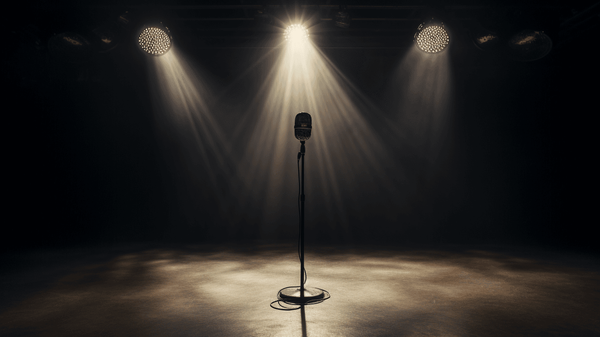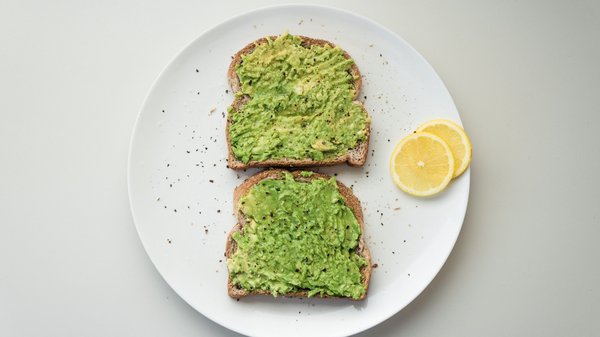The Most Contagious Things of the Year /
Contagious Team
/It’s been one hell of a year…again. In case you missed, forgot or repressed anything, the Contagious team has compiled a list of the (non-advertising) trends and events that we think defined 2021.

Photo by Ryan Cheng on Unsplash
Climate Doomism /
Heatwaves. Droughts. Floods. Followed by more heatwaves, droughts and floods. It’s easy to see why incessant news footage of catastrophic weather events contributed to a rise in Climate Doomism this year. Young people in particular feel that the planet is now beyond saving, and they blame governments and businesses (and by extension, brands) for betraying them.
A global survey funded by the research group Avaaz questioned 10,000 people aged 16 to 25 about their reactions to climate change. Three quarters said the future was frightening, with more than half feeling that humanity is doomed. Four out of 10 said they’d be hesitant about ever having children. The survey’s lead author, Bath University’s Caroline Hickman, told BBC News that environmental fears are causing increasing levels of chronic stress among young people: ‘This shows eco-anxiety is not just for environmental destruction alone, but inextricably linked to government inaction on climate change.’
While some are actively agitating against their leaders (such as taking 33 countries to court, arguing that failure to act on climate change constitutes cruelty under human rights legislation) many young folks feel it’s a futile fight. ‘Why do anything if we’re all doomed anyway’ seems to be the common refrain.
There’s a danger that whatever I now write here as a Gen X male might sound like the ‘blah blah blah’ platitudes that Greta Thunberg railed against in the run up to the Cop26 climate summit. So I asked my 19-year-old daughter – a university undergraduate – for her perspective. ‘A dying planet is the one issue that affects all of us equally, yet somehow the wealthy elite still feel separate from it,’ she said. ‘What’s the point of me recycling my mango pot from a Tesco Meal Deal when Kim Kardashian and Jeff Bezos hop on their private jets whenever they feel like it?’
She has a point. At cruising altitude, private jets are inured to heatwaves, droughts and floods.
By Paul Kemp-Robertson, co-founder and chief brand officer

Photo by Sung Jin Cho on Unsplash
Squid Game /
When a TV series is so popular that it causes a telco to file a lawsuit against Netflix because it drove such huge surges in broadband usage, it’s fair to say that the show was genuinely contagious. Racking up 1.65 billion hours of viewing in the 28 days after its release, Squid Game rapidly became Netflix’s biggest show, and a global phenomenon. Although the series pulls the same trick as the Hunger Games – asking the viewing public to condemn an elite group watching the poorer masses die for their entertainment, while the audience is literally watching the same events for their own entertainment – its popularity and cultural impact can’t be denied. In fact, its impact was so great that it inadvertently drove a 7,800% spike in sales of white slip-on Vans shoes (as worn by the show’s contestants), according to data from Sole Supplier. If you’re a footwear brand struggling to achieve the same results from your advertising, maybe it’s worth considering a subtitled ultra-violent commentary on wealth inequality for your next campaign?
By Alex Jenkins, editorial director
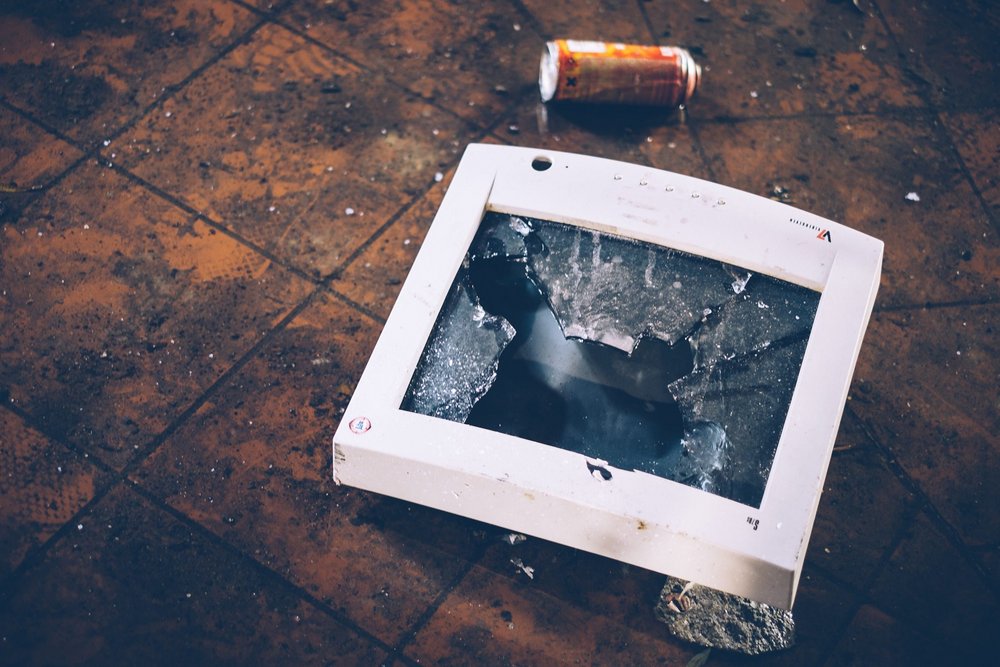
Photo by Julia Joppien on Unsplash
Techlash /
This year began with many people wondering about Jack Ma, the co-founder of Chinese tech behemoth Alibaba, who went missing in November 2020 after accusing his country’s banks of stifling innovation with their ‘pawn-shop mentality’. Ma later reappeared but his chastened demeanour and diminished celebrity sent a clear message that even beloved tech billionaires could be reined in by the ruling communist party.
And it was more or less downhill from there for China’s tech companies, as the government investigated, fined and regulated the sector into submission, wiping out over $1tn from the market cap of some of the world’s biggest internet companies in the process.
According to analysts, China’s crackdown is about asserting control over powerful private enterprises. The West has different motives and methods, but there, too, tech leaders are shifting uncomfortably in their seats.
One of the few things that unites the USA’s Democrat and Republican parties right now is a desire to bring big tech to heel, and President Joe Biden has made several appointments that show his intent – none more so than installing talented antitrust activist Lina Kahn as chair of the Federal Trade Commission in June.
America’s waning infatuation with the internet titans has brought the country more closely in line with the European Union. The EU has always had a bit of an itchy trigger finger when it comes to tech regulation and it is about to pass one of its most ambitious acts to date in the Digital Markets Act, which aims to curb the anti-competitive instincts of the largest online ‘gatekeepers’.
All told, the world in 2021 was a less amenable place for the companies that colonised the adolescent internet. Little wonder everyone’s so keen to bugger off to the metaverse.
By James Swift, online editor
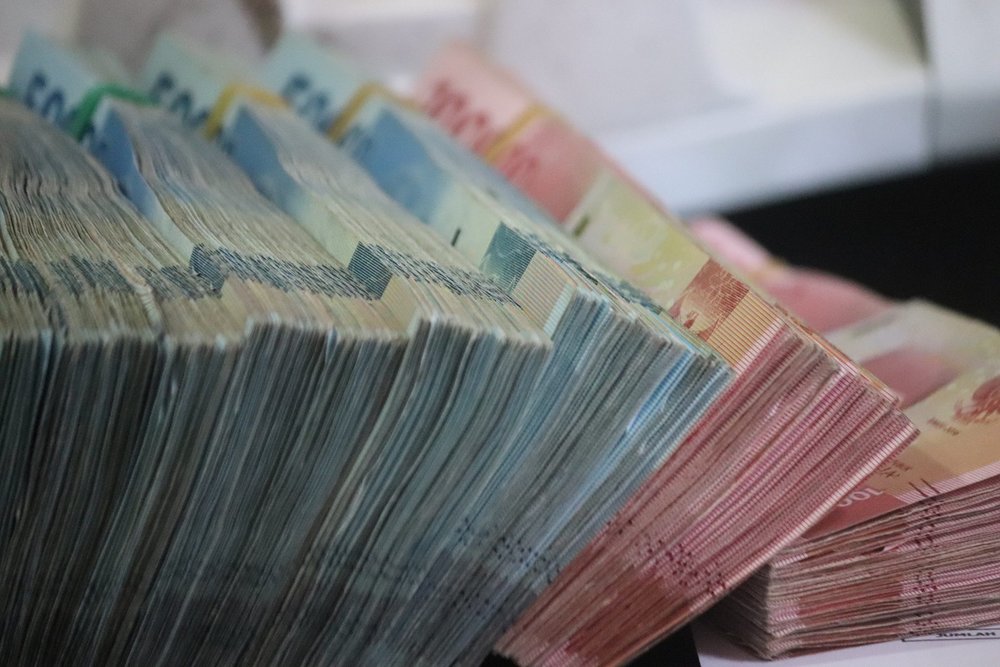
Photo by Mufid Majnun on Unsplash
Inflation /
At the end of November, the chairman of the US Federal Reserve, Jerome Powell, announced that he was going to stop using the word ‘transitory’ when talking about inflation because rising prices were no longer just a blip and the language of the Fed should reflect that. Between October 2020 and 2021, prices in the US rose 6.2%, faster than at any other time in the past three decades, according to the Consumer Price index.
But the soaring cost of living is not just an American problem. Inflation in the Eurozone rose to 4.9% in November, a pace unmatched since the introduction of the Euro, and in the UK it is at a decade-high 4.2%. In Asia, inflation is under better control but still trending up in places. Meanwhile, emerging markets like Brazil and Turkey are hurting worst of all.
The reasons are multitude: stimulus packages enacted by governments to see their people and economy through the pandemic, rising energy prices, supply-chain issues and an explosion of pent-up consumer demand after months of lockdowns.
None of these factors guarantee years of chronic inflation on the scale of the 1970s, but they are unlikely to be resolved by next year, either. The question for brands is whether to eat the rising costs and pray that it all blows over soon, or pass the hikes on to customers. The response of Unilever, PepsiCo, Procter & Gamble all points to the latter as the preferred option. If you’re in marketing, now’s probably a good time to brush up on the levers of price elasticity.
By Patrick Jeffrey, head of advisory, and James Swift, online editor

Photo by John Fornander on Unsplash
Mental health breaks for athletes /
Just days before she was due to play in the second round of the French Open at the end of May, four-time Grand Slam champion Naomi Osaka decided to drop out of the tennis tournament. The following month, US gymnast Simone Biles pulled out of several Olympic events, and in July England cricketer Ben Stokes took an indefinite break from the game, only returning this week.
Athletes often miss events due to physical injury, but each of the above made headlines for doing something different – they cited mental health reasons for their absences. In her withdrawal statement, Osaka said she has ‘had a really hard time coping’ with ‘long bouts of depression’, while Biles wanted to ‘put her mental health first’ and Stokes admitted to struggling with ‘difficult thoughts’.
There is clearly extreme pressure on athletes to perform, which can affect mental health – a 2016 academic study from the University of Melbourne found that elite athletes have a higher prevalence of disorders such as anxiety and depression compared with the general population.
But in recent years, there’s been increasing concern that athletes are overworked as a result of entertainment-fuelled and profit-driven sports events and schedules that don’t allow for breaks and recovery periods. And with Covid-19 causing uncertainty around missed and delayed events, and bio-secure bubbles keeping sports stars away from their support networks, it’s no wonder mental health has become even more of a concern.
And these issues are reflective of the world at large. Researchers have attributed an extra 76 million cases of anxiety and 53 million of depressive disorder to the personal, social and economic challenges posed by the pandemic. But the stance taken by the likes of Osaka is being seen too as people push for more open, honest conversations around mental health.
There is still some stigma attached to mental health – and tennis legend Billie Jean King wasn’t exactly supportive of Osaka’s decision – but as a society there are suggestions we’re moving in the right direction.
By Amelia Markham, strategist
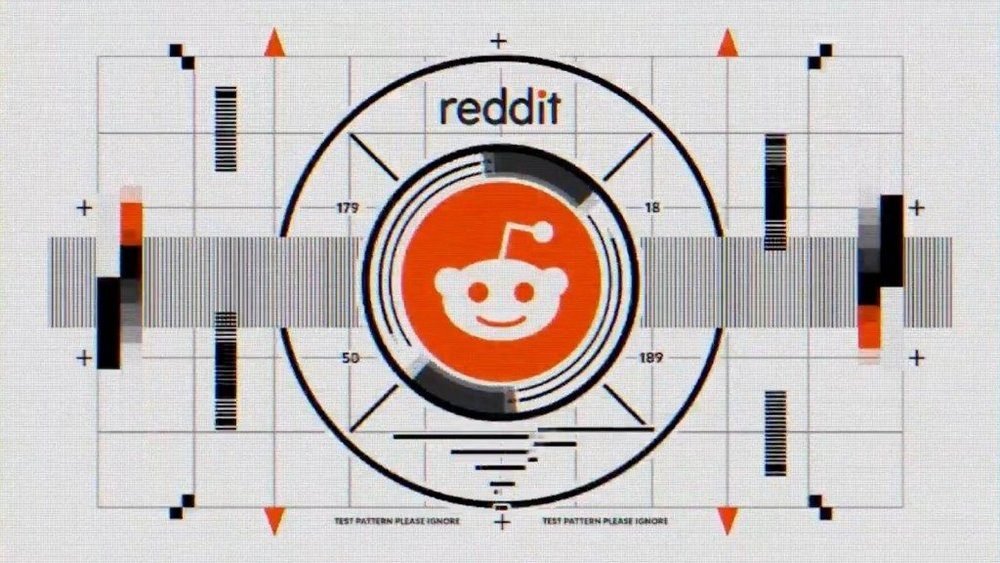
Meme Stocks /
Stock trading is fundamentally a social science but there has always been a method underlying the madness. Traders could analyse a company’s quarterly earnings, anticipated CEO departures or up-and-coming product innovations to inform their decisions.
However, the very model on which stock trading was built (buy low, sell high) came loose from its fastenings this year as bandwagoners threw their support and their cash behind struggling video-game retailer GameStop for apparently no other reason than it was fun.
On 27 January the stock closed at $347.51, which is 783% higher than a week earlier of $39.36. Buying at this price – the highest the GameStop stock has ever traded – would typically be an embarrassing thing for a trader to admit to. But people on the r/WallStreetBets Reddit forum who bought at that price were proudly asking for unique profile flairs (basically badges) to flaunt their irresponsible financial decisions to the rest of the community.
This helps to depict what the stock market had descended into, not the sophisticated Alexander Amosu-suit wearing Harvard grads on Wall Street, but a bunch of meme lords on Reddit chanting ‘apes strong together’ while posting rocket emojis. The alpha male of this congress of orangutans, ‘Roaring Kitty’, held a seven-hour long live stream on YouTube where he dunked chicken tenders into a glass of champagne while maniacally laughing at what the community had achieved – including his estimated $20m profit.
What’s worrying for financiers is that this madness could seemingly happen again, at any time and to any stock. For an industry based on confidence and the fundamentals of demand and supply, this poses a profound conundrum because it exploits all the weaknesses of the social science without actually being illegal (at least not yet). So what does this mean for the future of finance and stock trading? Well if I told you that, now that would be illegal.
By Sunil Bajaj, staff writer
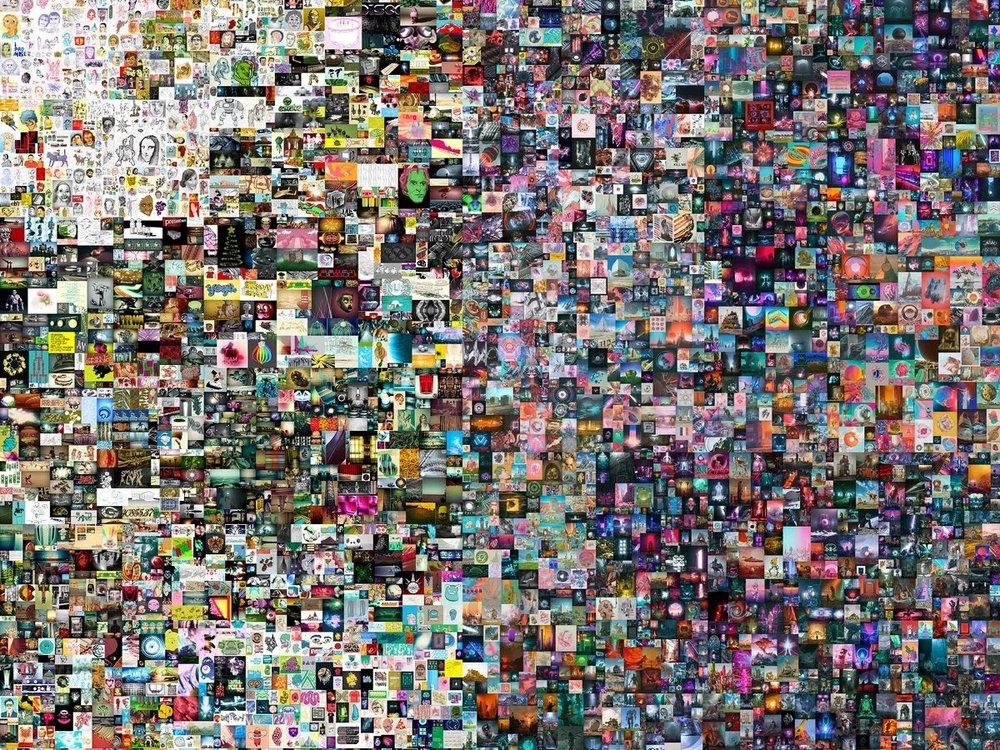
Everydays: The First 5000 Days, by Beeple
NFTs /
Collins Dictionary pronounced ‘NFT’ the word of the year and who are we to argue?
Collins Learning MD Alex Beecroft said it was ‘unusual’ for an abbreviation to experience such a huge spike in usage. ‘Whether the NFT will have a lasting influence is yet to be determined, but its sudden presence in conversations around the world makes it very clearly our word of the year,’ he added.
If you’re wondering, Collins defines the NFT (non-fungible token) as ‘a unique digital certificate, registered in a blockchain, that is used to record ownership of an asset such as an artwork or a collectible’. Personally, I don’t think I’ve said the word fungible out loud until this year. I’ve also never spent as much time thinking about what items are fungible or non-fungible (money = fungible, cats = non-fungible, CryptoKitties = definitely non-fungible).
If you’re a numbers person, rather than a wordsmith, then the evidence that NFTs have been a huge deal in 2021 is even stronger. Let’s start with the fact that in March US artist Beeple sold an NFT of his artwork Everydays: The First 5000 Days for $69.3m at Christie’s. In November, JPMorgan valued the NFT market at $7bn. Meanwhile, CoinTelegraph (a media publication that covers fintech and cryptocurrency), predicted that total NFT sales would reach $17.7bn by the end of the year.
Beyond the art world, we’ve seen NFTs everywhere from music (Kings of Leon made $2m by selling their latest album as an NFT in March) to sport (through initiatives by the NBA, the NFL and Formula1) and gaming (Ubisoft just announced it was incorporating NFTs in its games).
So why would someone spend $473,000 on a NFT of Disaster Girl (the meme of a girl standing in front of a burning building) or shell out $24.4m at Sotheby’s for a set of 107 NFTs of computer-generated cartoon apes? Well, that’s a different question, but the fact that they did so in 2021 makes the NFT undeniably one of the biggest things of the year.
By Chloe Markowicz, editor

Image credit: Blue Origin
Rich Men in Space /
2021 feels like the year the 21st century space race truly ignited into the petty, ego-driven pissing contest it was always destined to be.
To recap, July saw billionaire Richard Branson blast off for a quick jaunt that took him to an altitude of 85km – the edge of space! – on his Virgin Galactic rocket, Unity. A couple of weeks later, billionaire Blue Origin boss Jeff Bezos rode the strikingly phallic New Shepard to an altitude of 100km – the Kármán Line! – and he took nonagenarian Star Trek star William Shatner with him.
The obvious thing would have been for billionaire Elon Musk to commandeer his SpaceX Dragon capsule – already proven for proper orbital space flight – and take it for a couple of victory laps around the Earth, posting a selfie of himself flipping the bird to Bezos and Branson on Twitter along the way. But Elon is too cool for low-Earth orbit, preferring to let others fool around there until more of a ‘giant leap’ moment comes along.
Honestly though, it’s hard to care deeply about all this megabucks mid-life crisis posturing, and the lawsuits and sniping that accompany its uninspiring narrative. The original space race was a triumph against the odds, against nerve-janglingly basic technology, against a Cold War backdrop that suffused everything with a sense of jeopardy. This one feels like a triumph of self-indulgence and rocket-fuelled egos.
Sure, the sheer scale of this scientific endeavour will unlock benefits beyond the ability to catapult the privileged into space, but who will these benefits mostly be felt by? As planet Earth simmers its way towards a future of environmental ruin, there’s something rather galling about a series of experimental launches that release up to 300 tonnes of carbon dioxide into the atmosphere.
By Katrina Stirton Dodd, editor-at-large

Photo by Elisa Ventur on Unsplash
The Great Resignation /
In case you hadn’t heard, everyone’s quitting. The story is a familiar one: you’re getting up for your 257th day of working from home. Every day is the same. And when you strip away the commute, the office perks, or after-work drinks, it suddenly becomes blindingly obvious that you’re underpaid, overworked, or unfulfilled.
The buzzy term for this, ‘The Great Resignation’, was coined by Professor Anthony Klotz of Texas A&M University back in May, spawning a whole host of headlines, podcasts and think pieces about the Turnover Tsunami. The disruption of the pandemic has given many of us pause for thought, and work-life balance, working conditions, and salary are all factors behind the record resignation numbers.
It’s not happening everywhere. Europe’s employment and workforce participation are mostly at pre-pandemic levels, while places like Canada, Japan and New Zealand are not seeing unusually high turnover. But ‘The Great Resignation’ is a bona fide trend in US and the UK. According to the US Bureau of Labor Statistics, 24 million Americans handed in their notice between April and September this year, with roughly 4 million Americans quitting their jobs each month – resulting in severe labour shortages. The most recent US Labor Department’s monthly Job Openings and Labor Turnover Survey revealed that there were 11 million job openings on the last business day of October (up from 10.4 million in August).
Over the pond, a survey of 6,000 workers by the recruitment firm Randstad UK last month found that one in four workers was planning to change employers in the next few months. And don’t forget Brexit, which saw many foreign workers return to the EU during the pandemic and left industries such as hospitality, meat production, agriculture and transportation in critical need of workers – even sparking a nationwide panic over fuel shortages. By contrast, Europe’s employment and workforce participation are at pre-pandemic levels.
There are, of course, other factors at play: the devastation of Covid-19 reminded us that life is short. Greater awareness around mental health has led employees to challenge the culture of burnout that is rife at big-city firms. And an ageing workforce and baby boomers retiring in their 60s has left a lot of jobs open. In any case, 2021 was a big year for quitters, and don’t let your employer’s bribe of free snacks and office merch tell you otherwise.
By Phoebe O’Connell, staff writer
Honourable Mentions /
Sea Shanties
For a short-but-glorious period, the world was captivated by sea shanties. More specifically, it was one sea shanty, Wellerman, that grabbed the world by its lugholes after a postman called Nathan Evans uploaded a video to TikTok of himself singing it. Evans’ rendition of the folk song soared to the top of the UK charts in March, but then the world moved on, and we’ve heard nary a shanty since. Like ships that pass in the night.
Cheugy
In 2021 a new insult aimed at off-trend millennials apparently caught on among Gen Z. Cheugy refers to someone who tries hard to be trendy but misses the mark in ways that are very specific to people in their 30s, like wearing skinny jeans or being a bit too enthusiastic about Harry Potter. The Collins Dictionary named ‘cheugy’ a runner-up word of the year, but to be honest, a lot of the hype felt like the media trying engineer the same outrage that accompanied ‘OK Boomer’ in a bid to boost clicks. In fact, it seemed like a lot of people were willing ‘cheugy’ to be bigger deal than it was. It all felt a bit cheugy to us.
Squishmallows
A bit like Beanie Babies, Squishmallows are collectible soft toys that come in all different shapes and sizes, some of which are more rare (and more expensive) than others. Squishmallows’ popularity soared during the pandemic as source of simple comfort and fun for their young keepers, and a booming resale market emerged. Kellytoy, which makes Squishmallows, said that in March it had sold more than 73 million of the little critters (after just over two years in production) and that sales had tripled in the preceding six months.
Noodle the pug
Forget fortune tellers. This year millions of people looked to a 13-year-old pug called Noodle for daily guidance. In a popular series posted on TikTok by owner Jonathan Graziano, each day would be declared a ‘bones day’ if the dog stood up and a ‘no bones day’ if he slumped back down to his bed, meaning it’s time to prioritise self-care. Letting a sleeping dog lie has never meant so much to so many.
Learn more about the most vital advertising trends and campaigns of the year by downloading our 2021 Most Contagious Report for free, here.
Want more of the same? /
We don’t just write about best-in-class campaigns, interviews and trends. Our Members also receive access to briefings, online training, webinars, live events and much more.



